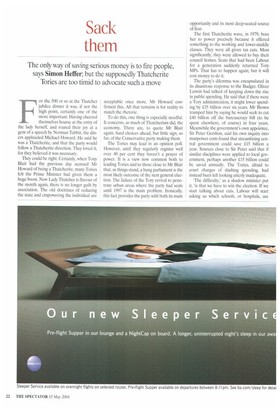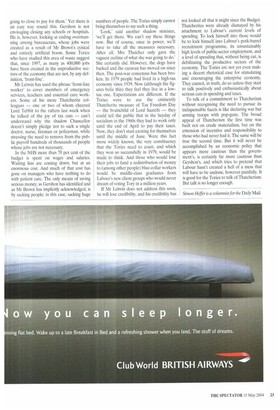Sack them
The only way of saving serious money is to fire people, says Simon Heifer; but the supposedly Thatcherite Tories are too timid to advocate such a move For the 500 or so at the Thatcher jubilee dinner it was, if not the high point, certainly one of the more important. Having cheered themselves hoarse at the entry of the lady herself, and roared their joy at a gem of a speech by Norman Tebbit, the diners applauded Michael Howard. He said he was a Thatcherite, and that the party would follow a Thatcherite direction. They loved it, for they believed it was necessary.
They could be right. Certainly, when Tony Blair had the previous day accused Mr Howard of being a Thatcherite, many Tories felt the Prime Minister had given them a huge boost. Now Lady Thatcher is flavour of the month again, there is no longer guilt by association. The old doctrines of reducing the state and empowering the individual are acceptable once more. Mr Howard confirmed this. All that remains is for reality to match the rhetoric.
To do this, one thing is especially needful. It concerns, as much of Thatcherism did, the economy. There are, to quote Mr Blair again, hard choices ahead, but little sign, so far, of the Conservative party making them.
The Tories may lead in an opinion poll. However, until they regularly register well over 40 per cent they haven't a prayer of power. It is a view now common both to leading Tories and to those close to Mr Blair that, as things stand, a hung parliament is the most likely outcome of the next general election. The failure of the Tory revival to penetrate urban areas where the party had seats until 1997 is the main problem. Ironically, this fact provides the party with both its main opportunity and its most deep-seated source of fear.
The first Thatcherite wave, in 1979, bore her to power precisely because it offered something to the working and lower-middle classes. They were all given tax cuts. Most significantly, they were allowed to buy their council homes. Seats that had been Labour for a generation suddenly returned Tory MPs. That has to happen again; but it will cost money to do it.
The party's dilemma was encapsulated in its disastrous response to the Budget. Oliver Letwin had talked of keeping down the rise in public spending. He said that if there were a Tory administration, it might lower spending by £35 billion over six years. Mr Brown trumped him by saying he would seek to cut £40 billion off the bureaucracy bill (to be spent elsewhere, of course) in four years. Meanwhile the government's own appointee, Sir Peter Gershon, said his own inquiry into manpower costs found that streamlining central government could save £15 billion a year. Sources close to Sir Peter said that if similar disciplines were applied to local government, perhaps another £15 billion could be saved annually. The Tories, afraid to court charges of slashing spending, had instead been left looking utterly inadequate.
'The difficulty,' as a shadow minister put it, 'is that we have to win the election. If we start talking about cuts, Labour will start asking us which schools, or hospitals, are going to close to pay for them.' Yet there is an easy way round this. Gershon is not envisaging closing any schools or hospitals. He is, however, looking at ending overmanning among bureaucrats, whose jobs were created as a result of Mr Brown's cynical and entirely artificial boom. Some Tories who have studied this area of waste suggest that, since 1997, as many as 400,000 jobs have been created in the unproductive sectors of the economy that are not, by any definition, 'front-line'.
Mr Letwin has used the phrase 'front-line worker' to cover members of emergency services, teachers and essential care workers. Some of his more Thatcherite colleagues — one or two of whom cheered Lord Tebbit to the rafters last week when he talked of the joy of tax cuts — can't understand why the shadow Chancellor doesn't simply pledge not to sack a single doctor, nurse, fireman or policeman, while stressing the need to remove from the public payroll hundreds of thousands of people whose jobs are not necessary.
In the NHS more than 70 per cent of the budget is spent on wages and salaries. Waiting lists are coming down, but at an enormous cost. And much of that cost has gone on managers who have nothing to do with patient care. The only means of saving serious money, as Gershon has identified and as Mr Brown has implicitly acknowledged, is by sacking people; in this case, sacking huge numbers of people. The Tories simply cannot bring themselves to say such a thing.
'Look,' said another shadow minister, 'we'll get there. We can't say these things now. But of course, once in power, we'll have to take all the measures necessary. After all, Mrs Thatcher only gave the vaguest outline of what she was going to do.' She certainly did. However, the dogs have barked and the caravan has moved on since then. The post-war consensus has been broken. In 1979 people had lived in a high-tax economy since 1939. Now (although the figures belie this) they feel they live in a lowtax one. Expectations are different. If the Tories were to use the eminently Thatcherite measure of Tax Freedom Day — the brainchild of Lard Saatchi — they could tell the public that in the heyday of socialism in the 1960s they had to work only until the end of April to pay their taxes. Now, they don't start earning for themselves until the middle of June. Were this fact more widely known, the very constituency that the Tories need to court, and which they won so successfully in 1979, would be made to think. And those who would lose their jobs to fund a redistribution of money to (among other people) blue-collar workers would be middle-class graduates from Labour's new client groups who would never dream of voting Tory in a million years.
If Mr Letwin does not address this soon, he will lose credibility, and his credibility has not looked all that it might since the Budget. Thatcherites were already dismayed by his attachment to Labour's current levels of spending. To lock himself into those would be to lock himself into Labour's pork-barrel recruitment programme, its unsustainably high levels of public-sector employment, and a level of spending that, without being cut, is debilitating the productive sectors of the economy. The Tories are not yet even making a decent rhetorical case for stimulating and encouraging the enterprise economy. They cannot, in truth, do so unless they start to talk positively and enthusiastically about serious cuts in spending and taxes.
To talk of a commitment to Thatcherism without recognising the need to pursue its indispensable facets is like declaring war but arming troops with pop-guns. The broad appeal of Thatcherism the first time was built not on crude materialism, but on the extension of incentive and responsibility to those who had never had it. The same will be true the second time. But it will never be accomplished by an economic policy that appears more cautious than the government's, is certainly far more cautious than Gershon's, and which tries to pretend that Labour hasn't created a hell of a mess that will have to be undone, however painfully. It is good for the Tories to talk of Thatcherism. But talk is no longer enough.
Simon Heifer is a columnist for the Daily Mail



































































































 Previous page
Previous page